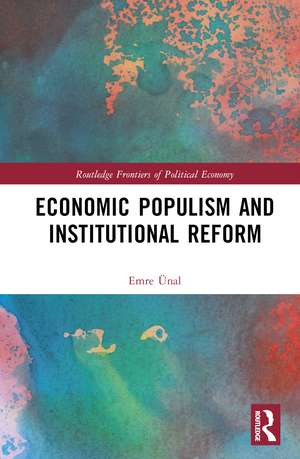Economic Populism and Institutional Reform: Routledge Frontiers of Political Economy
Autor Emre Ünalen Limba Engleză Hardback – 31 dec 2024
This book explores two forms of economic populism in particular (wage populism and exchange rate populism) and demonstrates that these types of policies result in high inflation, unstable exchange rates, and chronic macroeconomic problems. The book opens with an elucidation of the institutional economics approach - drawing on Commons and Veblen, and foregrounding laws, rules, norms, regulations, religions, and traditions – which sheds particular light on economic populism. The book also explores the different forms of economic populism which have been seen throughout the world including policies in the US, Brexit in the UK, the response to the Yellow Jackets in France, the populism of various countries in Latin America and regulations in China. Delving deeper, two case studies are explored in greater and comparative detail: Argentina and Turkey. In these countries, which have followed similar patterns, it is shown how following a path of economic populism has prevented the much-needed institutional reforms from being enacted. The book argues that adopting populist economic policies may prove popular in the short term but prevents and ignores the longer-term project of institutional reform which is needed to provide greater stability. Finally, the book also looks at the types of institutional and policy reform which may be required to prevent economic populism from taking hold.
This book will be of interest to readers in economics, political economy, politics and other social sciences who are grappling with issues around populism in all its forms.
Din seria Routledge Frontiers of Political Economy
-
 Preț: 309.90 lei
Preț: 309.90 lei -
 Preț: 309.79 lei
Preț: 309.79 lei -
 Preț: 316.03 lei
Preț: 316.03 lei -
 Preț: 310.95 lei
Preț: 310.95 lei - 9%
 Preț: 866.82 lei
Preț: 866.82 lei -
 Preț: 309.12 lei
Preț: 309.12 lei -
 Preț: 311.61 lei
Preț: 311.61 lei -
 Preț: 286.99 lei
Preț: 286.99 lei -
 Preț: 327.83 lei
Preț: 327.83 lei -
 Preț: 311.87 lei
Preț: 311.87 lei -
 Preț: 302.76 lei
Preț: 302.76 lei - 9%
 Preț: 938.48 lei
Preț: 938.48 lei -
 Preț: 152.67 lei
Preț: 152.67 lei -
 Preț: 151.97 lei
Preț: 151.97 lei -
 Preț: 318.54 lei
Preț: 318.54 lei -
 Preț: 317.95 lei
Preț: 317.95 lei -
 Preț: 310.01 lei
Preț: 310.01 lei -
 Preț: 326.49 lei
Preț: 326.49 lei -
 Preț: 155.44 lei
Preț: 155.44 lei -
 Preț: 309.79 lei
Preț: 309.79 lei -
 Preț: 328.76 lei
Preț: 328.76 lei -
 Preț: 281.72 lei
Preț: 281.72 lei -
 Preț: 286.58 lei
Preț: 286.58 lei -
 Preț: 386.12 lei
Preț: 386.12 lei -
 Preț: 353.78 lei
Preț: 353.78 lei -
 Preț: 325.09 lei
Preț: 325.09 lei -
 Preț: 310.55 lei
Preț: 310.55 lei -
 Preț: 387.03 lei
Preț: 387.03 lei -
 Preț: 324.87 lei
Preț: 324.87 lei -
 Preț: 312.86 lei
Preț: 312.86 lei -
 Preț: 374.16 lei
Preț: 374.16 lei -
 Preț: 329.09 lei
Preț: 329.09 lei -
 Preț: 348.22 lei
Preț: 348.22 lei - 28%
 Preț: 1047.06 lei
Preț: 1047.06 lei - 18%
 Preț: 1169.45 lei
Preț: 1169.45 lei - 18%
 Preț: 1555.17 lei
Preț: 1555.17 lei - 18%
 Preț: 1048.43 lei
Preț: 1048.43 lei - 18%
 Preț: 1059.84 lei
Preț: 1059.84 lei - 31%
 Preț: 767.47 lei
Preț: 767.47 lei - 18%
 Preț: 731.92 lei
Preț: 731.92 lei - 28%
 Preț: 822.54 lei
Preț: 822.54 lei - 18%
 Preț: 1796.21 lei
Preț: 1796.21 lei - 29%
 Preț: 1184.91 lei
Preț: 1184.91 lei - 18%
 Preț: 1120.23 lei
Preț: 1120.23 lei - 15%
 Preț: 700.95 lei
Preț: 700.95 lei - 18%
 Preț: 1116.31 lei
Preț: 1116.31 lei - 25%
 Preț: 299.52 lei
Preț: 299.52 lei
Preț: 936.08 lei
Preț vechi: 1028.65 lei
-9% Nou
Puncte Express: 1404
Preț estimativ în valută:
179.12€ • 195.18$ • 150.93£
179.12€ • 195.18$ • 150.93£
Carte tipărită la comandă
Livrare economică 23 aprilie-07 mai
Preluare comenzi: 021 569.72.76
Specificații
ISBN-13: 9781032571560
ISBN-10: 103257156X
Pagini: 256
Ilustrații: 6
Dimensiuni: 156 x 234 mm
Greutate: 0.57 kg
Ediția:1
Editura: Taylor & Francis
Colecția Routledge
Seria Routledge Frontiers of Political Economy
Locul publicării:Oxford, United Kingdom
ISBN-10: 103257156X
Pagini: 256
Ilustrații: 6
Dimensiuni: 156 x 234 mm
Greutate: 0.57 kg
Ediția:1
Editura: Taylor & Francis
Colecția Routledge
Seria Routledge Frontiers of Political Economy
Locul publicării:Oxford, United Kingdom
Public țintă
PostgraduateCuprins
1 Introduction 2 Institutional economics and its forms 3 Political economic approaches to power: Commons and Veblen 4 What is populism? 5 Forms of economic populism 6 Rising economic populism in Argentina and Türkiye 7 The nexus between economic populism and political aspects 8 Crises and policies 9 Economic populism from the 2000s 10 Why is there economic populism? 11 Conclusion Index
Notă biografică
Emre Ünal obtained his bachelor's degree from the Department of Economics at Istanbul University. He also pursued a master's degree in economic theory, with a specific emphasis on the institutional aspect. He successfully obtained his PhD from the Department of Economics at Kyoto University. Presently, he holds the position of associate professor at Firat University, specifically in the Department of Economics, located in Türkiye. While evaluating the book, he dedicated a portion of his time as a research fellow at the Faculty of Engineering at Kyushu University, Japan. He was employed at various universities and made visits to numerous institutions. He conducted research on growth models and institutional reforms, focusing on nations in East Asia and Europe. His areas of study include institutional economics, input-output analysis, East Asian economies, new technologies, energy economics, and financial economics. He authored publications in prestigious academic journals. He analyzes the institutional aspects within the framework of the global context. He tries to discover novel regulations aimed at mitigating economic obstacles. He proposes that conflicts within the market can be identified via institutional reforms.
Descriere
This book explores two forms of economic populism in particular (wage populism and exchange rate populism) and demonstrates that these types of policies result in high inflation, unstable exchange rates, and chronic macroeconomic problems.
